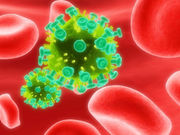Findings strongest for AIDS-defining cancers; no link for non-AIDS defining cancers not caused by viruses
MONDAY, June 11, 2018 (HealthDay News) — Antiretroviral therapy resulting in long-term viral suppression of HIV may contribute to cancer prevention, according to a study published online June 12 in the Annals of Internal Medicine.
Lesley S. Park, Ph.D., M.P.H., from Stanford University in Palo Alto, Calif., and colleagues assessed data from a large prospective cohort from the Veterans Affairs to determine whether long-term HIV suppression resulting from sustained antiretroviral therapy reduced the incidence of AIDS-defining cancers and non-AIDS-defining cancers (some of which are caused by oncogenic viruses). Participants included 42,441 HIV-positive veterans and 104,712 demographically-matched uninfected veterans (1999 to 2015).
The researchers found that cancer incidence for HIV-positive versus uninfected persons was highest for unsuppressed persons (relative risk [RR], 2.35), lower among persons with early suppression (RR, 1.99), and lowest among persons with long-term suppression (RR, 1.52). This trend was strongest for AIDS-defining cancers (unsuppressed: RR, 22.73; early suppression: RR, 9.48; long-term suppression: RR, 2.22) and much weaker for non-AIDS defining cancers caused by viruses (unsuppressed: RR, 3.82; early suppression: RR, 3.42; long-term suppression: RR, 3.17). No association was seen for non-AIDS defining cancers not caused by viruses.
“Patients with long-term viral suppression still had excess cancer risk,” the authors write.
Copyright © 2018 HealthDay. All rights reserved.








